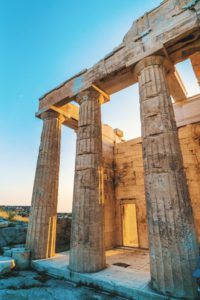People From the Past Seemed to Be Closer to „Nature” Than We

When reading Homer, you are seemingly dealing with different people. The Homeric heroes lived around three thousand years ago. On the one hand, reading the Iliad, you are terrified by the violence to which, in those times, people were exposed. – Of course, the Iliad is only a poem. Therefore, the main characters are creations of the human imagination; but warriors, battles, pillage and enslavement existed as reality. On the other, those poems enable you to catch a glimpse of a much slower flowing of time. People lived somewhere halfway between nature and civilization. It seems that they were closer to nature than to culture. Of course, they had a civilization that was quite developed. They were not some kind of savages, lacking culture and spirituality. But they had a sort of life experience that we might envy today, an experience that seemed to allow one to say that they embodied an atemporal human nature, and which did not require any arguments against moral relativism.
They lived a sort of universal human life, as do all the characters of literature, but they also transmit a feeling that real people of that time could have had a closer relationship to the „human genuine life” than we have today. They were „natural” beings, living close to nature, whereas we live a completely artificial life, far away from nature, in cities made of concrete and steel, seeing other animals only at the Zoo or as pets. They could have had the feeling that they belonged to nature, being surrounded by nature, whereas between us and nature we have the feeling that there is an insurmountable barrier.
Only rarely do we still experience nature, in holidays when we go to the countryside or into the mountains, or during extreme manifestations of nature, like hurricanes, inundations or earthquakes.
However, even in these episodes, nature doesn’t belong to our everyday experience, but it is like a separate room into which we enter for a while and from which we recede soon. Our usual life unfolds in a highly artificial environment, amidst hand-made things or more or less complicated artifacts. These artifacts are devoid of life; they don’t develop, don’t grow or decline.
Amidst them, we live within an aseptic medium, where we no longer feel the pulsation of life or the all-encompassing manifestation of time. The modern way of life also prevents us from reaching such an awareness: we are occupied with our jobs which, mostly take place inside offices, where the sole natural element is a lonely flower pot containing a wilting plant.
The Modern Loss of the „Essences”: the Background of Moral Relativism
One of the main associated processes of this quasi-isolation from nature is that we have given up the idea that things contain essences, that such essences would behave like seeds from which organisms develop. Undoubtedly, this relinquishment is not only a result of this isolation but also, especially, of the accumulation of knowledge.
The development of civilization allowed us to gather more and more facts that constantly required new hypotheses and theories in order to see them as unitary classes. Many times scientists needed to find a new unifying idea that could gather together wholly different things. By doing this they departed more and more from natural intuition, elaborating more and more these abstract unifying representations.
Metaphysical Skepticism and Functional Utility
However, this development of knowledge inevitably produced a metaphysical skepticism: according to it, our ideas are no longer capable of knowing external reality as it is indeed, but are only temporary theoretical models that will sooner or later be replaced by other more suitable models. These models are functional: they function as means that allow us to control and manipulate reality. The consequence is much deeper than we could have imagined.
We cannot pretend any longer that we know something for certain; we cannot any longer assert the existence of immutable values that last forever; we cannot say that reality is mirrored in our knowledge, or that there is a correspondence between mind and reality, as the good old philosophers of the past thought. We live thus in an age of absolute relativism which maintains that everything is good as long as it is useful, while it has a „cash value.”
Concepts Are Steps Toward Overcoming „Nature”

In a way, such a conclusion denies reality: we consider that we belong to the class of living beings, and therefore we might suppose that our brain and sensory organs are in continuity with the external environment. It is supposed that such beings could not have survived if they had not been adapted to this environment.
On the other hand, our concepts are far more than simply results of this adaptation: they are combinations and recombinations of previous concepts and representations that were elaborated in the past not by animals but by cultured human persons. All of our present concepts belong to culture and none to nature. Even our bodily movements are less felt than thought of and interpreted through the knowledge learned in high school.
What is more, due to these concepts we can virtually infinitely surpass the immediate environment, studying processes located millions of light years from us. Also, due to them, we can create things that could never have appeared spontaneously, either on Earth or anywhere else in the Universe: think of the recently developed quantum computers, or spaceships, or whatever other artifact. Is this capacity to surpass the external environment something still rooted in our organic side, the side which is grounded in our natural environment?
This question allows three answers. Two positives and one negative. The negative one states that our cognition is not grounded in our organic side. The other two answers are the following: a) there is a continuity, but we cannot know it; b) there is a continuity, and all of our knowledge can be reduced to that original natural layer of sensations and perceptions.
The second answer cannot be physically proved, i.e., there are no means by which we could reduce all of our concepts from a vast number of sciences and cultural domains to some original natural stratum. Thus, we are forced to admit as true the first answer: that there is a continuity, but we cannot know it.
As is obvious, this answer is a speculative one: that is to say, it reflects a metaphysical choice that cannot either be proved or rejected. Therefore, it has the same truth value as the negative answer that states that knowledge and external reality are entirely different. From a practical point of view, they have the same relevance. However, concerning our values they are different.
Can We Avoid Moral Relativism?
When we state that we live in a bubble, that our knowledge doesn’t reach reality as it is, it is as if we were cut off from our roots and were floating without direction like spores or pollen carried along by the wind, without any possibility of meeting a destination plant. All of our decisions have then only a ‘hic et nunc’ meaning, being only solutions to existing concrete problems.
Whatever you do cannot be relevant beyond the present context. You cannot formulate any moral ‘categorical imperative‘ that could be true by and in itself. You cannot speak pertinently of what exists beyond life, of death or of God, so your ideas concerning such a transcendence must be applicable to your actual situation. Everything comes down to a game without a stake.
Although God and death have always been seen as something completely different from everyday experience, there still has been conceived a sort of continuity between transcendence and our experience, since God created this life as a passing realm toward the real, eternal life. There was no abrupt break between these two realms.

But in a state where we deny, on the one hand, the existence of an immutable human nature and, on the other hand, the continuity between transcendence and immanence, can we still imagine that there is a God who acts according to different rules than the traditional God? This new God would be a divinity that doesn’t create immutable structures of reality, but likes immersion in relativism, continuous change and play, that takes nothing for granted.
Yes, this is the ever creating God, the God who doesn’t get tired of creating and destroying his own creation, of building and smashing it. The human being is the only one who can be in dialogue with Him.
The philosophical tradition speculated about the types of the infinite. At the beginning of modernity, Nicolaus Cusanus, a German cardinal, in the attempt to avoid pantheism, distinguished between the infinity of God and the infinity of the world by granting to God virtuality, whereas this world was considered only as the actual world, i.e., the content that was actualized from that virtuality.
Later, this distinction has faded out so that for Nietzsche this world did not tolerate any transcendence whatsoever: this world was a Dionysian world (actually it was Dionysus himself). The opposition between virtuality and actuality tended to be explained through complete immanence, i.e., by avoiding the idea of a separate ontological realm to which virtuality would belong. Due to this evolution, the idea of an immutable transcendent structure of reality disappeared too.
Also, philosophers reached more and more the awareness that our concepts divide reality into cases that cannot comprise the continuous character of reality. Already in antiquity, the paradoxes of Zeno reflected the difficulty of matching concepts with reality. However, philosophical tradition assumed that in itself, reality had a conceptual immutable structure whereas transformation took place only on the surface of it. This assumption disappeared as a consequence of renouncing the duality of transcendence-immanence.
Theology and its related domains has thus a difficult task: it has to save the traditional concept of God that was based on a way of interpreting nature, reality, and knowledge that cannot be sustained any longer. We cannot assume any longer the majority of the age-old features of the Christian God, those features that Christian theology borrowed from the ancient Greek philosophy in order to explain the structure of our world.
However, facing this intellectual puzzle, we may recall that Jesus did not support these metaphysical traits. He even refused to answer the question of Pilate ”what is truth?”.
The answer to this question seems to demand a conceptual framework.
On the other hand, He claimed that God is love. And love is indeed a mystery that escapes conceptual explanations. He only showed the direction in which we should understand what he meant by „love.” Given His fate, we can deduce that, for Him, love was mainly willingness to sacrifice oneself for others, for ‘neighbors,’ (understood, I think, as suffering neighbors) as well as for God – the latter in the form of complete submission to His will, seen as acceptance of the inevitable pain in life. And if we speak about the loving nature of God, we can understand it as the willingness of God to sacrifice Himself for the whole of humankind (because Jesus claimed that He and God were one, John 10:30).
Of course, this ‘love’ is neither the traditional ‘essence’ of man nor of God because man can exist without loving or sacrificing himself for the sake of his neighbors and God too since there are religions (based on revelation) where God is not seen as love. Therefore, in a way, love does not pertain to human nature, to that nature that was thought of as being able to be conceptualized.
It is a sort of feature that transcends this nature or what we could say about it, remaining a mystery for human understanding forever. Therefore, for Christians morality can still have an atemporal character, being independent of any progress of knowledge or social change: as long as Christians can believe that their God calls them to a self-sacrificing love, their deed can remain moral beyond ages.